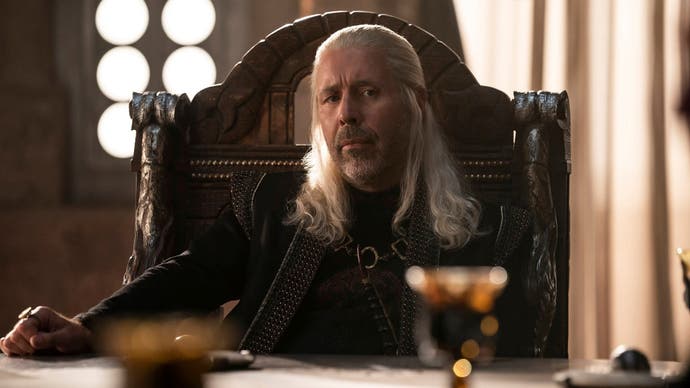House of the Dragon reminds me of one of my favourite features from Dragon Age 2
Viseryously.
House of the Dragon and Dragon Age 2 have something in common, and every time I watch an episode of Targaryen Family Dinners I am reminded of it. It's nothing to do with dragons, nor is it anything to do with inbreeding, because that would be weird. But it has everything to do with time.
One of the most interesting ideas in Dragon Age 2, which was fairly criticised at the time (2011) for being rushed out and cutting corners, was that the game would take place across a number of years. It wasn't many: it jumped one year, then three years, then another three years, each leap happening at the beginning of each major act in the game. It wasn't rooted, as others are, in events taking place across days or weeks or months. This meant Dragon Age 2 could show you long-term consequences to your actions, and fast-forward storylines to get you back to the interesting bits.
House of the Dragon does exactly the same thing. So far in the series we've jumped something like 19 years forwards in time. Part of this is out of necessity of course: the Fire and Blood novel it's based on is more like a history book than the zoomed-in adventure of A Song of Fire and Ice (which most people know as Game of Thrones). It charts 300 years of Targaryen rule, and only occasionally does it dive into notable rulers and passages of time - House of the Dragon being an example of this.
The time-leaping is a huge boon. It means the series can introduce children into the story but not be lumped with child actors for an entire season. It means there's self-generated excitement as people tune in to see what the freshly aged and newly cast characters are like. And it means, as in Dragon Age 2, that House of the Dragon can skip to the interesting bits and return to petri dishes it left festering to see what has happened or what is just about to.
I love this device so much I wonder why more games, and particularly role-playing games, don't use it more - I suppose Dragon Age 2 wasn't the head-turner we needed, though Dragon Quest 5 and Fable 3 have also had a go. To me, it's a missed opportunity. Role-playing games are specifically about our impact as players on a world, and by confining their time periods, we confine the kinds of stories they can tell. Maybe that's why every story revolves around an impending apocalypse.
Perhaps more importantly, we confine the kind of character development games can show. Think about how much more we could see if we spent years with characters rather than days or weeks. Think how exciting it would be to see them change and grow in a world that altered around them. We'd allow games to show far more than only a snapshot of a place. They could tell stories of entire worlds and lifetimes, rather than only moments within them.
It's time.


